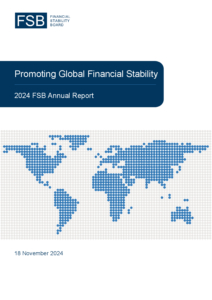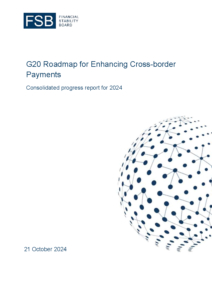The views expressed in these remarks are those of the speaker and do not necessarily reflect those of the FSB or its members.
Governor, many thanks for your invitation to this important symposium. I look forward to our discussions on the vital topics that are on our agenda today.
The way you have structured the agenda and your initiative in inviting speakers such as myself from global standard setting bodies indicates strongly your understanding of the inter-connectedness between us all. Financial stability is a pre-condition of all our hopes and plans to improve the prosperity of our populations and build for the future. The risks to the stability of the financial system are complex. The degree of uncertainty we all face in trying to assess those risks is high. Understanding that those risks are closely related to the inter-connectedness between us is crucial.
In a sense all our work on financial stability is about adopting a prudent common sense in how we make use of the financial system. In a simpler world, we might have done that separately, each jurisdiction taking care of their own financial system and each jurisdiction either reaping the long term benefits of its prudence or paying the price for imprudence. That is not an option for any of us any more. We all have to recognize that what happens in, for example, US financial markets can impact the prosperity of people in Asian economies. What happens in Africa can impact on the prosperity of people in Europe and vice versa.
We have long since opened the path for trade, commerce and finance to be conducted on an increasingly global basis. Supply lines and financing packages link us to each other across the globe. The losses faced by one can very quickly become the losses faced by all.
As recently as last August we saw a significant shock to the financial markets in Japan, but what was telling was that it impacted across the globe. Thankfully it did not last. The system stabilised. People adjusted their portfolios and as prices adjusted market participants had the liquid assets needed to meet the margin calls that the price movements triggered. This is the good news. But it reminded us, if we needed reminding, of our interconnectedness. A farmer in rural Morocco and a trader on Wall Street are connected by the invisible stands of the global economy.
It is tempting some times to think that that is not the case. Just as it is tempting sometimes to wish it were not the case. But we should recall firmly both the opportunities that arise from our interconnectedness and the risks that are unavoidably associated with having such a complex inter-connected global system.
Our organisation has been established to monitor the vulnerabilities that are inherent in the financial system and to call out bravely when we see that action must be taken. Our role is also to coordinate the development of polices by our members to manage those vulnerabilities without the opportunities inherent in the financial system being lost. We require your cooperation and support to make that work.
I am just back from the G20 meeting in Brazil. In Azerbaijan, COP 29 discussions closed over the weekend. All around we see intensive efforts to manage our complex global economy so that it creates benefits for people in their daily lives. There was a palpable sense of purpose in Brazil to fight hunger and poverty just as, at every COP, there is a deeply honest engagement by so many with the planetary climate issues we all face. But in neither place can you get away from the immensity of the tasks we face in trying to be our best selves and to coordinate globally.
I don’t want to avoid acknowledging, either, that the task we all face in trying to keep the financial system stable is immensely difficult. At the FSB we have issued 28 substantial reports over the last 12 months on a whole range of issues that must be tackled for the financial system to remain stable. Frankly, this is not exceptional. Every year we must work constantly on emerging issues like climate and technological innovation, we must revisit exiting regulatory frameworks to improve them in light of events and we must monitor what jurisdictions are doing to encourage responsible behaviour.
And it is not only us. Each of the global standard setting bodies, the Basel Committee, the IAIS represented here, IOSCO represented here and the CPMI have to work without pause to support the stability of the financial system.
And in everything we do, we have to keep in mind the concerns of all our members, not least the distinct issues facing emerging economies. I hope and I am sure that in the panel discussion we are about to have we will have an opportunity to highlight those distinctive issues facing emerging economies.
You might be a little sceptical as to whether I mean that. You might suspect that I would think that if I can keep the major global markets and global banks stable the system will be stable. But that is not the case. I have just emphasised the importance of our inter-connectedness. But that connectedness works both ways. We all need emerging economies to be able to grow and develop in a stable way because the shocks that can destabilise the global economy can start anywhere. The risks that can turn into amplifying chains of events that cause us all to lose out through a crisis can build up anywhere. When emerging economies face what has been called a silent debt crisis, the world economy faces a threat. When emerging economies are prosperous and well managed, the whole global economy is better set on course towards prosperity.
After this event, I will make my way to the plenary meeting of the FSB where we will review the overall vulnerabilities in the system and set our work for next year. Bound into all those discussions, is our continuing focus on emerging economies.
One of the areas that the FSB works on that directly relates to emerging economies is our work to develop the cross border payments services around the world that no one relies on more than those who send remittances back home. We have been working on this challenging area for some years. We have made very good progress on a whole range of policy issues that might get in the way of efficient, transparent, low cost payment services for all. Despite the success of our work in getting rid of those obstacles we continue to see those seeking to make payments across borders having to live with services that are too slow, that are too expensive and that are not sufficiently transparent.
This work is proving difficult. Perhaps that is not surprising. Perhaps no one should ever have expected that the system would just quickly improve. Like so much else in the global financial system, payments services are complex when they start to operate across borders. There are a whole range of complexities that influence the quality of service users get. Sanctions screening, money laundering controls, capital controls, differences in technical standards limitations on competition.
The situation here in Africa is particularly concerning.
Fundamentally, we can do better. The fast payments systems that have been introduced in many countries show that we can do better. But getting those systems to work together across borders is difficult.
We have published results this year that show limited improvement in the user experiences. But we are determined that we will go on with the work. We will do what is necessary to make the payments system work better.
As we have carried through the work we have promised to do, we have inevitably uncovered additional complications. We are engaging with data regulators. We are engaging with the private sector intensively. The OECD, the World Bank and the IMF are joining us in this work, as is FATF. And of course, the CPMI is our close partner in this work.
It should be no surprise that this has proven difficult. It should, I hope, come as no surprise that we are determined to continue this work. We have a lot of experience in bringing in complex reforms sometimes in the face of sceptical voices.
Sustainable, fair, low cost, transparent payment services across the globe serves us all. It shines a light on the benefits of our interconnectedness and helps those benefits to be shared with those who have stayed behind.
I give this as one example of the sense of conscious awareness of our social obligations with which the FSB and its members do their work. I look forward today to our discussions on financial stability. I again thank the organisers of this conference who help us to do our job with initiatives such as this.
Thank you.

